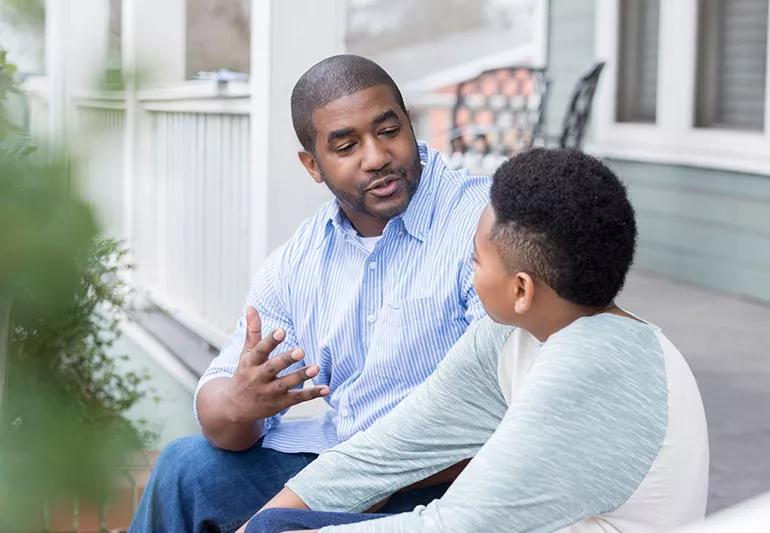Helping children, tweens and teens prepare for their turn at the COVID-19 vaccine

Image content: This image is available to view online.
View image online (https://assets.clevelandclinic.org/transform/aea85d8f-bca2-4a40-97a9-67814d0bcc39/TalkingToChildrenAboutVaccine-950832482-770x533-1_jpg)
Adult talking to child about vaccines on porch steps
You’ve thought about how to have “the talk” with your kids, but here’s one big conversation you might not have prepared for: how to talk to children about their upcoming COVID-19 vaccine shots.
Advertisement
Cleveland Clinic is a non-profit academic medical center. Advertising on our site helps support our mission. We do not endorse non-Cleveland Clinic products or services. Policy
“It’s really important that kids understand that what you’re doing for them is designed to help keep them healthy and safe,” says pediatrician Kimberly Giuliano, MD.
With Pfizer’s COVID-19 vaccine now approved for children as young as 12 — and possibly available to kids ages 5-11 by fall — Dr. Giuliano walks you through the process of talking to your children about getting the vaccine.
“Whether it’s the COVID vaccine or any other vaccine, it’s really important that kids understand why we’re giving them the vaccine,” Dr. Giuliano says. “We’re not giving them the vaccine to be mean. We’re giving the vaccine to prevent a disease.”
Explain to your child that getting vaccinated is the best way for them to be able to return to the activities and experiences they miss most, like school, extracurricular activities, summer camp and vacations. It’s also the only way to protect others.
“Vaccinating everybody around them really helps to prevent and reduce the risk that we’re spreading it to each other,” Dr. Giuliano says.
There’s a lot of mixed messaging and plenty of vaccine naysayers out there — and kids are hearing about them, just like adults are.
“Ask your child what they’ve heard about the vaccine so that you understand where they’re coming from,” Dr. Giuliuno says. “Maybe they’re 100% on board, and this conversation is going to be very quick and easy, or maybe they have some questions and concerns.”
Advertisement
Giving them an opportunity to air those questions and concerns allows you to address them head-on and dig into answers that reassure your child that you’re making this decision for their health and safety.
If someone in your family experienced negative side effects from the COVID-19 vaccine, or if your child knows someone else who did, they may be afraid of having a similar experience.
Many people experience no side effects from the vaccine, but some do; fortunately, though, those side effects are typically mild and short-lived. They include:
Explain to your kids that any potential side effects, while undesirable, are better than the alternative: getting COVID-19.
“I often use the explanation for any vaccine that the disease is far worse than the actual injection or the side effects that can come from the vaccine,” Dr. Giuliano says.
Older teens might have questions about the safety of the vaccine itself. Parents and guardians are the adults that teens trust most, so you can help allay your kids’ concerns by reassuring them that the vaccine is safe.
Explain that the vaccine had to undergo significant testing before being approved for their age group.
Following rigorous testing and analysis, all three vaccines approved by the FDA have been found to be both safe and effective. Before being made available to the public, the Pfizer vaccine was thoroughly tested specifically to determine its safety and effectiveness in children ages 12-15.
“Children currently are receiving the exact same vaccine as adults, with no difference in terms of dose or content,” Dr. Giuliano explains. “There are no additional risks, and children are tolerating the Pfizer vaccine very similarly to the adults in terms of both effectiveness and safety.”
“The best way to prepare a child for the vaccine is to let them know what to expect,” Dr. Giuliano says.
Talk through what will happen the day of your child’s first vaccine appointment, including where they’ll get it done, how things will work and how long it’s likely to take.
And while you may be tempted to give your child a pain reliever in advance of receiving the vaccine, Dr. Giuliano advises against it, as they lower the body’s antibody response.
“In order for the vaccine to be most efficacious, it’s best if we don’t interfere with what our body is doing,” she says.
Adults who are already vaccinated can serve as a walking advertisement for the vaccine.
Advertisement
“Share your own vaccine story with them,” Dr. Giuliano says. “Share with them the importance of the vaccine: how it is safe, effective, and can help us get back to what we long for in terms of normal life.”
Advertisement

Sign up for our Health Essentials emails for expert guidance on nutrition, fitness, sleep, skin care and more.
Learn more about our editorial process.
Advertisement
Understand who may (and may not) benefit
How to protect your little one from bacteria and viruses
The short answer: It’s complicated, but the basic care precautions still prevail, like washing your hands and isolating if you’re sick
They can feel like a typical headache or a migraine headache, but the pain can last for weeks to months
Any large social gathering — from a family birthday party to an indoor music concert — has the potential to spread serious infection
It’s important to connect with a healthcare provider, get quality sleep and balance your activities with your energy levels
Symptoms can overlap and be hard to distinguish, but there are some telltale differences
Just like the flu, COVID-19 will continue to evolve every year
Type 2 diabetes isn’t inevitable with these dietary changes
Applying a hot or cold compress can help with pain
Pump up your iron intake with foods like tuna, tofu and turkey